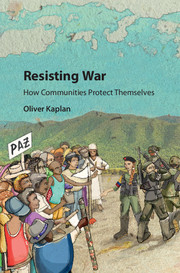Book contents
- Frontmatter
- Dedication
- Contents
- List of Figures
- List of Tables
- Preface and Acknowledgments
- List of Abbreviations
- 1 Introduction: Civilian Autonomy in Civil War
- 2 A Theory of Civilian Decision-Making in Civil War
- 3 The History of Conflict and Local Autonomy in Colombia
- 4 Living to Tell About It: Research in Conflict Settings
- 5 How Civilian Organizations Affect Civil War Violence
- 6 Why Some Communities Are More Organized than Others
- 7 The Institution of the ATCC: Protection through Conciliation
- 8 Discovering Civilian Autonomy in Cundinamarca
- 9 Civilian Autonomy around the World
- 10 Conclusions and Policy Implications
- Appendix A Archives Consulted
- Appendix B Supplementary Documentation on the ATCC
- Glossary
- References
- Index
2 - A Theory of Civilian Decision-Making in Civil War
Published online by Cambridge University Press: 13 June 2017
- Frontmatter
- Dedication
- Contents
- List of Figures
- List of Tables
- Preface and Acknowledgments
- List of Abbreviations
- 1 Introduction: Civilian Autonomy in Civil War
- 2 A Theory of Civilian Decision-Making in Civil War
- 3 The History of Conflict and Local Autonomy in Colombia
- 4 Living to Tell About It: Research in Conflict Settings
- 5 How Civilian Organizations Affect Civil War Violence
- 6 Why Some Communities Are More Organized than Others
- 7 The Institution of the ATCC: Protection through Conciliation
- 8 Discovering Civilian Autonomy in Cundinamarca
- 9 Civilian Autonomy around the World
- 10 Conclusions and Policy Implications
- Appendix A Archives Consulted
- Appendix B Supplementary Documentation on the ATCC
- Glossary
- References
- Index
Summary
“Many people wrongly think it is [just] the Association that should come to the defense of each individual, but it should be the opposite.”
– Resident of La India, Santander, 1995 (ATCC Archives)“The guerrilla respects the thinking of the Association [ATCC]. There's no reason why it should disappear. On the contrary, it should be strengthened.”
– FARC Commander, 2001, near La India, Santander (ATCC Archives)“The mentality of the armed groups has changed a lot and we respect certain things.”
– Paramilitary Subcommander, 2001, near La India, Santander (ATCC Archives)One Saturday morning in La India, an elder conciliator invited me to join him at the Adventist mass. Since the church had a strong influence on the ATCC's nonviolent approach, I jumped at the chance. From the main street, we walked a few minutes through a small wooded area and came upon a clearing and the church. I watched as the congregation greeted each other, then we entered and sat in a pew in the front row. As the service began, the people sang hymns and read along from the prayerbook. I quickly lost my place, however, so I quietly nudged my companion to ask him where we were. So as not to disturb the songs, he whispered, “I don't know.” Since he was following along and skimming the pages with his finger, I quizzically asked, “What do you mean you don't know?” He looked over at me sheepishly, shrugged his shoulders, and said, “I don't read.” His reply was stunning, and was an epiphany for how impressive the mobilization of the ATCC and other communities around Colombia truly was. Indeed, how is it that ordinary people like this elder conciliator are able to confront violence? The answer is a story of organization.
Civil wars are not fought in social vacuums. They are fought in social landscapes. These landscapes are often variable, with notable social differences from one town or village to the next. My central argument is that these differences shape how civilians cope with civil war conflict and, in turn, how they are treated by armed actors. In this chapter, I outline a theory of when, how, and why variation in cross-community characteristics, such as organization, affect outcomes for civilians in civil war settings.
- Type
- Chapter
- Information
- Resisting WarHow Communities Protect Themselves, pp. 33 - 61Publisher: Cambridge University PressPrint publication year: 2017



